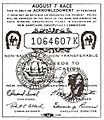Lottery facts for kids
A lottery is a type of game where people choose numbers. If their numbers match the ones drawn, they can win a prize. This prize is usually money. Some governments do not allow lotteries. However, many others permit them. For a long time, lotteries were against the law in most places. This included countries in Europe and the United States. This ban lasted until after World War II. Today, lotteries are a way for some countries, like the United States, to make money.
Contents
How Lotteries Work
Playing the lottery is usually simple. People buy a ticket and pick a set of numbers. Sometimes, the numbers are chosen for them randomly. After a certain time, a drawing takes place. This is when winning numbers are picked, often by a machine. If the numbers on a ticket match the drawn numbers, the ticket holder wins a prize. The biggest prize is called the jackpot.
Picking Your Numbers
When you play the lottery, you usually choose a few numbers from a larger group. For example, you might pick 6 numbers from 1 to 49. Some lotteries also have a bonus number. This extra number can help you win smaller prizes.
The Drawing Process
Lottery drawings are often shown on television. Special machines are used to pick the winning numbers. These machines are designed to be fair and random. This means every number has an equal chance of being chosen.
Winning Prizes
You don't always need to match all the numbers to win. Many lotteries offer smaller prizes for matching some of the numbers. The more numbers you match, the bigger your prize will be.
Lotteries and Governments
Lotteries are a big business in many countries. Governments often run or control them. They do this because lotteries can bring in a lot of money. This money is called revenue.
Funding Public Services
The money from lotteries is often used for good causes. Governments use this revenue to pay for public services. These can include schools, roads, parks, and hospitals. So, when people buy a lottery ticket, they are also helping their community.
Rules and Regulations
Because lotteries involve money, they are carefully regulated. Governments set strict rules to make sure lotteries are fair. They also work to prevent cheating. This helps to protect the people who play.
History of Lotteries
Lotteries have been around for a very long time. They were used in ancient times to decide things. For example, they helped decide who got land. They also helped choose soldiers.
Early Lotteries
The first known lotteries were in China. They helped fund big projects. One of these projects was the Great Wall of China. In Europe, lotteries were used to raise money for towns. They also helped build churches and other public works.
Lotteries in the United States
In early American history, lotteries were very popular. They helped fund many famous institutions. For example, Harvard University and Yale University used lotteries to raise money. Even the American Revolutionary War was partly funded by a lottery.
Bans and Comebacks
Over time, some people started to see lotteries as a problem. Many countries decided to ban them. This happened in the United States and Europe. The bans lasted for many years. However, after World War II, lotteries started to come back. Governments saw them as a way to raise money for public services. Today, lotteries are legal in many parts of the world.
Images for kids
-
Massachusetts Lottery Ticket 1758 French & Indian Wars
-
1776 Lottery ticket issued by the Continental Congress to finance the American Revolutionary War.
-
Harvard Lottery Ticket 1811
-
Ticket from an 1814 lottery to raise money for Queen's College, New Jersey.
-
New Hampshire Lottery Ticket 1964
See also
 In Spanish: Lotería para niños
In Spanish: Lotería para niños
 | Janet Taylor Pickett |
 | Synthia Saint James |
 | Howardena Pindell |
 | Faith Ringgold |











